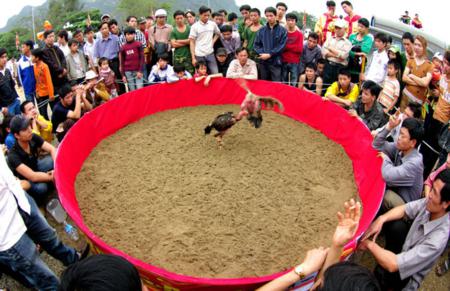Cock fighting, a long-standing form of popular entertainment, is organised during traditional festivals throughout Vietnam.
Raising roosters for cockfighting requires heavy investments in time and labour. Professional trainers choose young chickens carefully, individually preparing their food and drink, bathing them, separating them from hens, and training them in fighting positions. A fighting cock must be so acquainted with its owner that it will allow only the owner to hold him. Fighting cocks, which come from three main species, are colloquially called “sacred chickens” or “combat roosters”. Black roosters with a red comb and a long neck are full of stamina and will fight to the bitter end. White roosters with ivory-coloured feet and round yellow eyes are hot-tempered and perform “lightning battles”. Also popular are “five-coloured cocks” coated with black, yellow, brown, red and blackish blue feathers. They fight with flexibility and often run away if they lose.
The owners prepare a 1.5m-wide ring walled by a 20cm-high bamboo screen. Spectators stand outside the screen. Only the owners of the fighting cocks are allowed to enter the area to care for their animals. A rooster loses if it leaves the ring twice and does not return.
Before a cockfight begins, owners agree on the terms among themselves. They compare the size, weight and combat achievements of their roosters. If one rooster has longer spurs, its rival is allowed to wear artificial spurs. After the discussion and agreement, the owners bring their birds into the ring. The cocks are kept in two separate halves of the ring until a signal is given to start the fight. Cocks usually attempt some trial feints to gauge their competitor’s reactions before giving mortal thrashings: a double kick against the rival’s body, a cut to the neck using spurs, or pecking out the rival’s eyes.
The fight continues until one bird is defeated. Contestants time the rounds by burning an incense slick or draining water can with a hole in it.
Vietnamese cockfights have two forms of compensation. In one version, the loser pays an agreed-upon sum lo the winner; in the other, the loser forfeits both money and the defeated bird.

